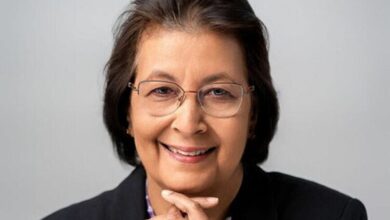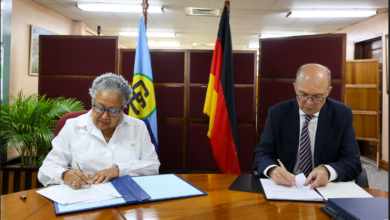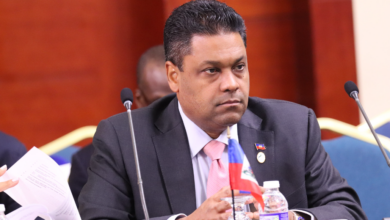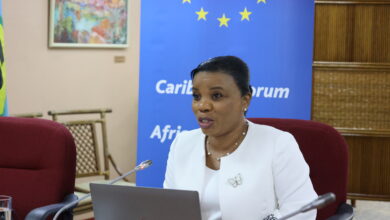CARICOM Heads of Government, in London en route to the Commonwealth Heads of Government Meeting (CHOGM) in Abuja, Nigeria, met over breakfast with UK Prime Minister Tony Blair today at his invitation.
They took the opportunity at this the latest in their biennial discussions, to exchange views on a number of issues of mutual interest, particularly those relating to trade and to security.
In the area of trade, discussions centered on two key matters, namely the question of how to restart the stalled WTO negotiations following their collapse in September in Cancun, Mexico; and the upcoming negotiations for a Regional Economic Partnership Agreement (REPA) between the EU and the Caribbean countries party to the ACP-EU Cotonou Agreement.
As regards the WTO, CARICOM leaders reiterated their determination to play their part in the resumption of the negotiations and were reassured by the UK Prime Minister’s reaffirmation of his country’s commitment to live up to the objectives of the Doha Development Agenda.
In relation to the upcoming negotiations with the EU, CARICOM leaders noted the views of the UK Prime Minister on: the critical importance of special and differential treatment; the need for increased adjustment support; and the need for a heightened role for services.
In highlighting the importance of commodities in their trade relations with the EU, CARICOM leaders, cognizant of the bitter consequences of the reform of the Banana Regime, expressed grave concern regarding the upcoming reforms of the EU Sugar Regime and its implications for the ACP-EU Sugar Protocol, which is enshrined in all ACP-EU Conventions as being of “indefinite duration”.
The importance of the sugar industry was generally recognised, particularly to the economies of the six CARICOM countries party to the Sugar Protocol – Barbados, Belize, Guyana, Jamaica, St Kitts and Nevis and Trinidad and Tobago – in terms of foreign exchange and employment especially for the rural population. It was therefore accepted that there was need to pay great attention to the social and economic implications of that reform and to provide some measure of support to assist in the restructuring of the industry and in the upgrading of its competitiveness.
The situation regarding rice – another important regional commodity exported to the EU market – was also raised with the UK Prime Minister as a matter of serious concern to the Community. CARICOM leaders highlighted the fact that the situation for this commodity, for which significant reduction in export earnings seem certain in light of decisions already taken by the EU, had worsened the trading prospects of the Region in that market. CARICOM Heads of Government pointed out further, that when this issue is added to that of bananas and sugar, the Caribbean faced a serious trade situation in the upcoming REPA negotiations.
While promising that his government would do its utmost to assist the Region in the REPA negotiations, the UK Prime Minister emphasized the hard but incapable choices which the CARICOM Region would need to make and the fact that the UK represented but one voice among many in the EU.
In the area of Security, CARICOM leaders referred to the many dimensions of this threat to the social and economic well-being of the Region. Caught between the major suppliers of drugs to the south and the major markets for drugs to the north, the leaders pointed out that the countries of the Caribbean were increasingly becoming engulfed in virtually all its facets. This situation is rendered more complex complemented as it is by organized transnational crime and, aided by a growing traffic in small arms – all of which serve to fuel to an alarming level, rising domestic crime in the countries of the Region. It has also resulted in the reallocation of already scarce resources – both human and financial – from combating traditional domestic anti-social behaviour to drug generated crimes.
Much appreciation was expressed for the UK’s support in the fight against these various dimensions of the security threat. Notwithstanding, it was advanced that there was need to rethink the approach to combating this threat, given its changing nature, content and intensity. The UK leader agreed that his country would continue to work with the Region to respond to the situation, aware of the rising cost of meeting the threat and of their mutual interest in overcoming it. As part of this process, consideration will be given to the development of a Plan of Action.
The health dimension of the security threat to CARICOM societies represented by HIV/AIDS was also considered, given its serious implications for the Region. The recent call to action by the UK government, and its participation in developing a Regional Strategy across the Caribbean, working with the Clinton Foundation, was recognized by the leaders as an important initiative in the fight against this scourge.
The leaders agreed that these many issues would be discussed further at the next meeting of the UK-Caribbean Forum scheduled to be held in the UK in May 2004.
Referring to the upcoming CHOGM in Nigeria, the leaders expressed their desire for a productive meeting focusing on the theme “Democracy and Development”.
The CARICOM Delegation present at the deliberations were: Most Hon. P. J. Patterson, Prime Minister of Jamaica and Chairman of the Conference, Hon Perry Christie, Prime Minister of The Bahamas, Hon Said Musa, Prime Minister of Belize, H.E. Bharrat Jagdeo, President of Guyana, Hon Dr. Denzil Douglas, Prime Minister of St. Kitts & Nevis, Dr. the Hon Kenny Anthony, Prime Minister of Saint Lucia, H.E. Edwin Carrington, Secretary General of CARICOM and H.E Dr. Richard Bernal, Director General of the Caribbean Regional Negotiating Machinery.





